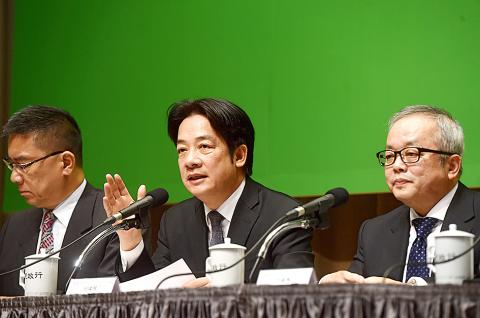The Executive Yuan yesterday unveiled a set of plans to increase the wages of low-paid workers, including hiking the minimum wage for government employees to NT$30,000 (US$1,009) per month, encouraging or pressing private firms to follow suit, and raising the statutory hourly wage rate to NT$150 from NT$140.
A Cabinet report presented by Vice Premier Shih Jun-ji (施俊吉) at a news conference showed the number of employees who earned less than NT$30,000 per month last year was about 3.051 million, or 34 percent of the employed population, 51.8 percent of whom were 15 to 29 years old.
Atypical workers — those who have no fixed term of employment, including part-time workers, outsourced workers and workers on temporary contracts — accounted for a large percentage of the low-wage population, the report showed.

Photo: Chien Jung-fong, Taipei Times
Last year, there were 805,000 atypical workers in the nation, accounting for 7.11 percent of the total working population, which was an increase of 155,000 from 2008, the report showed.
As of May last year, the average salary of atypical workers was about NT$22,550, just above the statutory minimum monthly wage of NT$22,000, Directorate-General of Budget, Accounting and Statistics data showed.
Of the 3.051 million people earning less than NT$30,000 per month, at least 19,410 were employed at listed companies, and 16,067 at government agencies, state-owned enterprises or government-funded institutions, the report showed.
That meant that nearly 99 percent were employees of small and medium-sized enterprises that were not listed on the stock exchange, the report said.
Shih said that under the Cabinet’s proposed “five major policies and 16 measures,” the monthly salary paid to the 16,067 people employed at government or state-run enterprises would be increased to NT$30,000, but that it would be done gradually to avoid disrupting the equity of the salary structure.
Such a move would cost the government an additional NT$962 million annually, he said, adding that listed companies should be responsible for raising the salaries of their own employees, which the Cabinet said would cost the firms an estimated NT$964 million annually.
Low pay is one of the issues that the public has asked the government to solve, and after several cross-departmental meetings, the Executive Yuan has proposed a strategy, Premier William Lai (賴清德) said.
In the short term, the government is to increase public workers’ salaries, include salary standards as a bonus item when accessing companies for government procurement and awards, encourage private businesses to raise salaries, make salaries transparent and raise the minimum hourly wage, he said.
In the medium-to-long term, the government is to increase investments, speed up industry upgrades, reduce the burden on employees, improve the quality of human resources and minimize the gap between academia and industry, he said.
The main issue is a lack of investment, Lai added.
President Tsai Ing-wen’s (蔡英文) proposed “five plus two” industrial innovation plan would help raise salaries, he said, adding that the Executive Yuan is to continue to push the strategy.
The Cabinet has also suggested raising the statutory hourly wage to NT$150 from NT$140 when the Basic Wage Deliberation Committee meets later this year to review minimum wages.
Additional reporting by Chen Yu-fu

The CIA has a message for Chinese government officials worried about their place in Chinese President Xi Jinping’s (習近平) government: Come work with us. The agency released two Mandarin-language videos on social media on Thursday inviting disgruntled officials to contact the CIA. The recruitment videos posted on YouTube and X racked up more than 5 million views combined in their first day. The outreach comes as CIA Director John Ratcliffe has vowed to boost the agency’s use of intelligence from human sources and its focus on China, which has recently targeted US officials with its own espionage operations. The videos are “aimed at

STEADFAST FRIEND: The bills encourage increased Taiwan-US engagement and address China’s distortion of UN Resolution 2758 to isolate Taiwan internationally The Presidential Office yesterday thanked the US House of Representatives for unanimously passing two Taiwan-related bills highlighting its solid support for Taiwan’s democracy and global participation, and for deepening bilateral relations. One of the bills, the Taiwan Assurance Implementation Act, requires the US Department of State to periodically review its guidelines for engagement with Taiwan, and report to the US Congress on the guidelines and plans to lift self-imposed limitations on US-Taiwan engagement. The other bill is the Taiwan International Solidarity Act, which clarifies that UN Resolution 2758 does not address the issue of the representation of Taiwan or its people in

US Indo-Pacific Commander Admiral Samuel Paparo on Friday expressed concern over the rate at which China is diversifying its military exercises, the Financial Times (FT) reported on Saturday. “The rates of change on the depth and breadth of their exercises is the one non-linear effect that I’ve seen in the last year that wakes me up at night or keeps me up at night,” Paparo was quoted by FT as saying while attending the annual Sedona Forum at the McCain Institute in Arizona. Paparo also expressed concern over the speed with which China was expanding its military. While the US

SHIFT: Taiwan’s better-than-expected first-quarter GDP and signs of weakness in the US have driven global capital back to emerging markets, the central bank head said The central bank yesterday blamed market speculation for the steep rise in the local currency, and urged exporters and financial institutions to stay calm and stop panic sell-offs to avoid hurting their own profitability. The nation’s top monetary policymaker said that it would step in, if necessary, to maintain order and stability in the foreign exchange market. The remarks came as the NT dollar yesterday closed up NT$0.919 to NT$30.145 against the US dollar in Taipei trading, after rising as high as NT$29.59 in intraday trading. The local currency has surged 5.85 percent against the greenback over the past two sessions, central